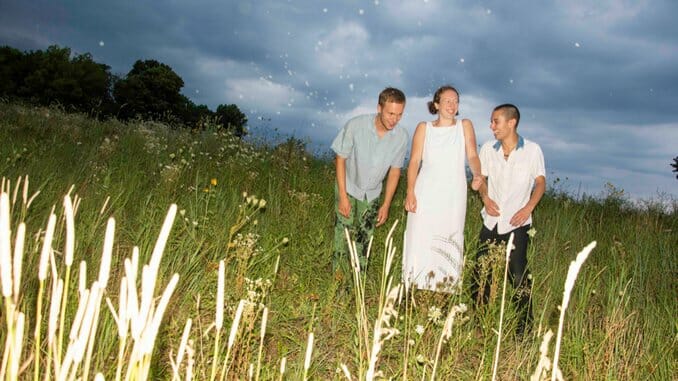Moontype: The Best of What’s Next
Photo by Julia Dratel
For years, Paste has introduced exciting, up-and-coming artists to our readers. This is the return of The Best of What’s Next, a monthly profile column which highlights new acts with big potential—the artists you’ll want to tell your friends about the minute you first hear their music. Explore them all here.
Friendship, water and glass have a lot in common. For starters, they’re essential for modern life, and they can be beautiful, life-affirming and often long-lasting. Similarly, they’re all powerful and capable of wreaking havoc. But most interestingly, we can see our reflection in each of them, whether it’s a storefront, a pond or even a friendship. We cultivate our identity in friendships, relying on them for acceptance and affirmation. Friends make us think differently about ourselves, and the people we choose to have around embody what kind of people we are and want to be.
These three things also inform Bodies of Water, the impressive debut album from Chicago trio Moontype (out on April 2 via Born Yesterday Records). The record is full of references to water in various states of matter, cherished quality time and glass as a symbol of perspective—all devices to highlight the tender, wholesome moments that keep us going. It’s a sweet, intimate record, bolstered by the love each band member has for each other. All graduates of the prestigious Oberlin Conservatory of Music, they’re incredibly warm and anything but pretentious—they joke about acting like “complete idiots” at the beach during their “Ferry” music video shoot, poke fun at guitarist Ben Cruz’s “business office” and roast drummer Emerson Hunton, whose pants were so stylish that his bandmates thought he was too cool for them before they all actually met. They also reminisce about playing country music on a friend’s back porch and visiting swimming holes in Tennessee while on tour—they’re so clearly at ease with each other, which gives their music an enticing glow.
Before embarking on this journey together as channelers of benevolence and fairly eccentric rock, Moontype cultivated their own love of music in different ways. Margaret McCarthy, the band’s songwriter, lead vocalist and bassist, got her start singing in choir and playing piano from a young age. She later began making electronic music on her computer, which led to a degree in music technology at Oberlin, in addition to geology (which is fitting, given Moontype’s elemental reverence). Finding her feet in the college’s rich DIY scene, she took up bass guitar after receiving the hand-me-down instrument from her father’s friend, which Moontype now affectionately refer to as “the divorce bass.”
Cruz was awash in a land of Guitar Hero and classic rock covers as a kid, but ended up studying jazz guitar at Oberlin and playing “very strange” improvisational jazz alongside Hunton. Hunton grew up playing the piano and drums, eventually gravitating towards the improvisational music scene in his Twin Cities hometown and frequenting shows of acclaimed jazz trio Fat Kid Wednesdays. Cruz and Hunton played together in various configurations at Oberlin and post-college in Chicago—from the challenging jazz of Threadbare to the charming country music of Razor Shines.
Though they never played as a three-piece at Oberlin, they all ended up in Chicago afterwards, and Cruz and Hunton became fascinated by McCarthy’s songs and solo performances—both with only bass and vocals. “Usually when a singer/songwriter writes songs, there’s chords and there’s melody,” Cruz says. “But because Margaret was doing everything on electric bass, it was all basically counterpoint, like two voice parts with the bass part and the melody part. The songs just sounded so good as they were, and of course I wanted to play them.”
“Margaret said it was bass and voice, so I had no idea what to expect,” Hunton says. “I just remember being very pleasantly surprised by how twisty and turny things were.” Moontype’s “twisty and turny” quality is one of several contributing factors to their magnetism. Though their songs are rooted in a pleasant wash of soft-sung folk, rock and indie-pop, there are occasional flourishes to throw you off their scent.
Debut album highlight “Alpha” may begin as a sparse, downtempo rock number, but it quickly unfurls into a whiplash-inducing, math rock-tinged firecracker, culminating in a rhythm-and-blues-meets-jazz guitar solo. “Lush” is another pretty track, but it takes an unexpected detour via ballsy power chords and a refrain of the capital-R rock variety: “The edge of glory.” Luckily for us, the face melting doesn’t stop there—Cruz slips into a wailing classic prog solo on “When You Say Yes” and breaks into jaunty country noodling on “Stuck on You.”
“These are always problems that I create for myself, where I play stuff that’s highly inappropriate, and someone else decides that it needs to be in the song,” Cruz jokes. Even a more straightforward song like the painfully gorgeous “Ferry” is surprising in its own way. With beaming shared vocals, coarse guitars and a visceral sense of longing at the center, the song stretches on for over five minutes, despite its instantaneous pop appeal that typically warrants a track about half as long.
McCarthy wrote the songs that make up Bodies of Water before graduating from Oberlin, and if you listen back to those early solo recordings, you can hear many of Moontype’s eccentricities already baked in, like the intriguing melodic arcs of “Anti-Divinity” or “Alpha.” It’s not a stretch to think their time at Oberlin had something to do with their ability to throw a wrench into conventional rock songs. “The general vibe at that school is people are very encouraging of weird art,” McCarthy explains. “Nothing is really too out there. So I feel like that encouraged me to make whatever I felt like making and really go for it.”